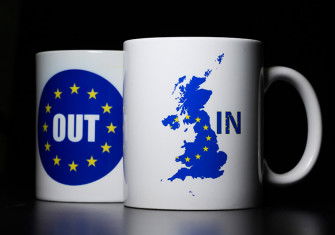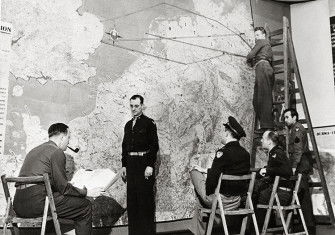Boris Johnson's Abuse of Churchill
In using Churchill to justify his Brexit campaign, Boris Johnson 'paints a barbarically simplified and ill-informed picture of what Churchill stood for'.
 Britain stands on the brink of history as it prepares for its ‘in/out’ referendum on membership of the European Union, which takes place on June 23rd. The stakes could not be higher. After more than 40 years of increasing economic and political co-operation with the states of continental Europe, David Cameron’s referendum holds the real prospect of a division in the West and the isolation of one of Europe’s greatest national powers. If ‘Brexiteers’ get their way, according to Boris Johnson, June 24th will be known to future generations as Independence Day.
Britain stands on the brink of history as it prepares for its ‘in/out’ referendum on membership of the European Union, which takes place on June 23rd. The stakes could not be higher. After more than 40 years of increasing economic and political co-operation with the states of continental Europe, David Cameron’s referendum holds the real prospect of a division in the West and the isolation of one of Europe’s greatest national powers. If ‘Brexiteers’ get their way, according to Boris Johnson, June 24th will be known to future generations as Independence Day.
When David Cameron succumbed to domestic party political pressure in 2013 and announced his referendum he knew he was playing with fire. For Margaret Thatcher the referendum was ‘a device of dictators and demagogues’; for the celebrated 19th-century historian Lord Acton it is ‘the triumph of democratic force over democratic freedom’; for the current Conservative Cabinet it is a highly flammable political football. It is unlikely Cameron anticipated the incendiary match he is now forced to strike.
Johnson soon became the totemic figurehead of the Leave campaign, a spokesman for an independent United Kingdom, or whatever is left of it after the Europhile Scots try once again to secede. His support brings an irresistible energy to the out campaign and the possibility that a majority of Britons will join him in voting to leave the European Union.
On March 16th, Johnson published his campaign manifesto to leave the European Union in the Daily Telegraph. Every sentence, every word was written towards a conclusion in which Johnson invokes the spirit of Winston Churchill as the ultimate historical justification of his position. ‘Whatever happens,’ he wrote, ‘Britain needs to be supportive of its friends and allies – but on the lines originally proposed by Winston Churchill: interested, associated, but not absorbed; with Europe – but not comprised.’
With his bestselling biography, The Churchill Factor: How One Man Made History, Johnson deliberately appropriated the mantle of the man who saved western civilization from collapse in 1940. Churchill’s John Bull hat replaced with a grey ‘underground’ beanie, the cigar with a ‘Boris bike’, the three-piece Harris Tweed suit with trouser clips. Every aspect of BoJo’s studied get-up is meant to scream at us: he is the indefatigable leader for our time. He is the man to make history. He is the British bulldog.
There is just one problem: how to claim Churchill as support for the ‘out’ campaign beyond the grave? How can Johnson use his hero to force ‘Brexit’ and therewith permanently damage the European project? The only way, evidently, is to paint a barbarically simplified and ill-informed picture of what Churchill stood for.
After the Second World War, ousted from No. 10 following the general election of July 1945, Churchill became the greatest pioneer of the European ideal. ‘If I were 10 years younger,’ he told his wife shortly after the war, ‘I might be the first President of the United States of Europe.’ In September 1946 in Zurich Churchill called upon France and Germany to enter into a partnership as the first step in building ‘a kind of United States of Europe.’ The speech went down in history, as Churchill foresaw and intended, as a turning point: a Magna Carta of European unity. By 1950 Churchill had founded the United Europe Movement, a well-funded British pressure group for a European Union; organised the unofficial but foundational Congress of Europe in The Hague; helped create the international European Movement; pressured the European governments west of the Iron Curtain into creating the Council of Europe, Europe’s first political institution; championed and helped pass the European Convention on Human Rights in Strasbourg; secured West Germany’s re-entry into the European family of nations; and even launched the controversial idea of a European army.
The supreme irony of Johnson's Daily Telegraph manifesto, titled ‘One way to get the change we want – vote to leave the EU’, is that Winston Churchill published his original programme for what he interchangeably called ‘the European Union’ or ‘United Europe’ in the very same newspaper on December 30th and 31st, 1946. Its title: ‘United Europe: One way to stop a new war.’ In the two-part article, among other things, Churchill presented his expansive view of Britain’s global role as a partner in three great overlapping ‘circles’: the English-speaking world (the ‘special relationship’ with America), the British Empire and Commonwealth and the European Union.
There were, of course, severe difficulties holding Britain back from the realisation of this world view. A debilitated domestic economy, surging independence movements in the colonies and increasing financial and political dependence on the United States were the primary pains of postwar Britain. The country had neither the political clout nor the financial resources to play the role it felt entitled to after the heroics of the war. An acute awareness of these problems only strengthened Churchill in envisaging for his country a position of power at the heart of his three circles.
The important thing was the issue of compatibility. While he probably never intellectually reconciled the full implications for Britain of ever-closer union in Europe, Churchill certainly envisaged for his country to be a full partner in the postwar European ‘project’. He thought a marriage with Europe could complement Britain’s Commonwealth responsibilities and advocated a system that embraced both the European states and the dominions and territories associated with them. ‘For Britain to enter a European Union from which the Empire and Commonwealth would be excluded,’ he told a European Movement rally in 1949, ‘would not only be impossible but would, in the eyes of Europe, enormously reduce the value of our participation.’ The United States, much like today, thought of Britain as a European country and hoped it would lead the way in the gradual unification of the continent to which it belonged. Hence General Marshall’s explicit reference to Churchill’s European campaign as the source of inspiration for Marshall Aid.
In his 1946 Telegraph article, Churchill drew a roadmap for European integration that started with the creation of the Council of Europe. First, he argued, the Council of Europe would have to work steadily towards ‘the abolition or at least the diminution of tariff and customs barriers’. Second, it would ‘strive for economic harmony as a stepping-stone to economic unity’. Third, it would have to ‘reach some common form of defence’. And fourth, inseparably woven with all of the above, it would have to establish a common currency. European postage stamps, passports and trading facilities would all flow out naturally from ‘main channel’ of the Council.
Notwithstanding his references to economic unity, what strikes the 21st-century reader is that Churchill’s case for Europe was essentially political. Having witnessed two devastating European wars, he believed deeply that small nation protectionism could only give rise to political antagonisms. Only a meaningful sharing of national sovereignty, he argued, could prevent future wars and secure continued prosperity. It was for this reason that Churchill, in one of his most moving contributions to parliamentary debate, declared on behalf of the Conservative Party on June 27th, 1950 that ‘national sovereignty is not inviolable, and that it may be resolutely diminished for the sake of all the men in all the lands finding their way home together’. This is a far cry from Boris Johnson’s vague, negative and shallow appeals to protecting national sovereignty and ‘taking back control’.
To be sure, Churchill did write in a 1930 article for the American Saturday Evening Post, when the British Empire was still flourishing and before there was an immediate and obvious demand for Union which the war indelibly created, that Britain would stand aloof from a federal Europe: ‘interested and associated, but not absorbed’. He also never believed, evidenced by his lack of initiative when returned to No. 10 in 1951, that Britain could become an ‘ordinary’ member of a federal union in the short term. It is highly misleading, however, for Johnson to take a drop out of the ocean of words that Churchill dedicated to the matter and take them to characterise Churchill’s whole approach to Britain’s role in Europe. This issue is far more intricate.
In Churchill’s postwar vision for a European Union, Britain played an integral part: ‘I do not agree that the solution to our problem is to create a Europe excluding Britain,’ he wrote in December 1949. ‘British participation is essential to the success of a European Union. It is impossible to say at the moment what form this union will ultimately take, but I am sure that the next immediate step is to develop and strengthen by every means in our power the new Council of Europe.’
In his chapter on Churchill’s Europe, Boris Johnson never even mentions the Council of Europe. He completely misses the key point that for Churchill the only way to achieve complete political and economic union and, perhaps ultimately, federation (this was a long-term, theoretical problem) was to let the Council of Europe grow organically into something much more than the platform of European opinion it was in 1949. Step by step. Little by little. Ever-closer union.
Frustrated with the slow working methods of the Council of Europe, the continental Europeans ultimately rode the wave of Churchill’s campaign and took the initiative in creating the direct institutional predecessors of the European Union. In 1962, when Prime Minister Harold Macmillan’s Britain felt ready to join the European Economic Community, as the EU was then called, Churchill supported the government’s membership application. While rightly sceptical of the chances of success and careful to stress that no damage should be done to Commonwealth interests, he wrote in a public letter: ‘I think that the Government are right to apply to join the European Economic Community.’
The unity in Europe, now in the form of the imperfect European Union, is to a great extent the evolved and still organically developing legacy of Winston Churchill. That is the inheritance which Johnson is asking the British people to turn their backs on.
It is an inconvenient history for Johnson and his campaign. And, indeed, one man can make history. That is the Churchill Factor. But to alter history as you see fit is wholly unacceptable. Boris or not.
Felix Klos is the author of Churchill on Europe: The Untold Story of Churchill's European Project (I.B. Tauris: June, 2016) @Felix_Klos






